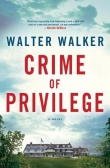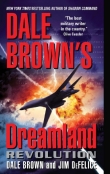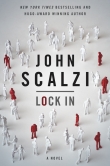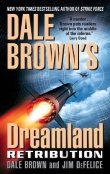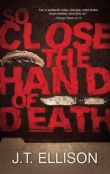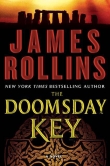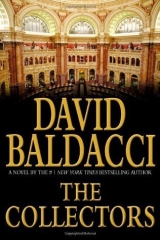
Текст книги "The Collectors"
Автор книги: David Baldacci
сообщить о нарушении
Текущая страница: 26 (всего у книги 27 страниц)
Chapter 66
Stone and the others rode the escalator out of the Metro along with hundreds of other panicked people. While sirens filled the air and a small army of police converged on the area to investigate the rampage, they walked down the street aimlessly.
“Thank goodness Caleb’s okay,” Milton said.
“Absolutely,” Reuben bellowed. He grabbed Caleb around the shoulders. “What the hell would we do without you to tease?”
“Caleb, how did you come to be abducted?” Stone asked curiously.
Caleb quickly explained about the man calling himself William Foxworth. “He said he had books for me to look at, and then the next thing I know, I’m unconscious.”
“Foxworth, that was the name he used?” Stone asked.
“Yes, it was on his library card, so he would’ve had to show some ID to get it.”
“Undoubtedly not his real name. At least we got a look at him.”
“What do we do now?” Annabelle asked.
“What I still don’t understand is how the chemical wash was put in the books,” Milton said. “Albert Trent works on the intelligence committee staff. He gets the secrets somehow and then passes them on to whom? And how do they end up in books at the reading room where Jewell English and presumably Norman Janklow see and write them down using their special glasses?”
While they were all mulling those questions, Stone used his cell phone to check in with Alex Ford. They were still looking for Trent, but Ford advised Stone and the others to pull back from the chase. “No sense in putting yourselves in more danger,” he said. “You’ve done enough.”
After Stone had told them that, Caleb said, “So where do we go? Home?”
Stone shook his head. “The Library of Congress is near here. I want to go there.”
Caleb wanted to know why.
“Because that’s where this all started, and a library is always a good place to get answers.”
Caleb was able to get them into the library but not the reading room because it was closed on Saturday. Wandering the halls, Stone said to the others, “What confuses me most of all is the timing of events.” He paused, marshaling his thoughts. “Jewell English came to the reading room two days ago, and the highlights were in the Beadle book. Later that night, when we had the book, the highlights vanished. That is a very tight time frame.”
Caleb said, “It is amazing, really, because most books in the vault sit unread for years, even decades. The highlighting would have to go on the letters, and Jewell would have to be contacted to come in with the name of the book to ask for. Then, like you said, that very same day the highlights disappear.”
Stone stopped walking and leaned against a marble banister. “Yet how could they be so sure the timing would work? You wouldn’t want the wash to remain on the pages very long in case the police got their hands on them. Indeed, if we’d acted a little sooner, we might have gotten the book to the FBI before the chemical evaporated. So logically, the highlighting had to have taken place close to the time English came in.”
Caleb said, “I’d been in and out of the vaults before Jewell came in that day. I didn’t see anyone in there other than some of the staff, and none stayed longer than ten or fifteen minutes. That wouldn’t have been nearly long enough to highlight all those letters. And they couldn’t have done it anywhere else, because that would require them taking the book home.” He jerked. “Wait a minute. If any of the staff had taken it home, I can check that. They’d have to fill out the four–part call slip. Come on! The reading room’s closed, but I can check from another place.”
He led them to the library’s main reference desk, talked to the woman there for a few moments and then stepped behind the counter, logged on the computer and started typing. A minute later he looked disappointed. “No Beadles have been checked out. In fact, no books at all have been checked out by library personnel in over four months.”
While they all were standing there, Rachel Jeffries walked by. She was the conservator Caleb had brought the Beadle dime novel containing the highlights to for repair.
She said, “Oh, hello, Caleb, I didn’t think you came in on weekends anymore.”
“Hi, Rachel, just doing some research.”
“I’m trying to catch up on some backlog at conservation. I popped over here to meet with someone on a project I’m doing. Oh, while I have you, I wanted to let you know that the Beadle you gave me to work on had just recently been returned to the vault after repairs.”
“What?” Caleb said, stunned.
“It had some back cover damage and a few loose pages. When I looked up its conservation history, I was really surprised because, like I said, it had just been brought back to the vault. Any idea how it was damaged again?”
“When exactly had it been brought back to the vault?” Caleb asked, ignoring her question.
“Why, the day before you gave it to me.”
“Rachel, hang on a minute.” Caleb started tapping on the computer keyboard again. He was looking for how many Beadles had been sent to conservation in the recent past. His answer came back quickly as the software churned through the data.
“Thirty–six Beadles repaired over the last two years,” he said to the others. Next he checked the records for books Jewell English and Norman Janklow had requested, together with all books that had gone to the conservation department over the last six months. He found that Jewell English had requested 70 percent of the Beadles that had been repaired in the last six months. And she’d requested them on the exact day they had come back from conservation. He found a similar pattern for Norman Janklow.
He told the others the results of his search. “The Beadles require a lot of preservation work because they were so cheaply made.”
Stone, whose mind had raced ahead of the others, looked at Rachel Jeffries. “Can you tell us which conservator repaired that particular Beadle?”
“Oh, sure, it was Monty Chambers.”
Stone and the others started running down the long corridor.
Caleb called back over his shoulder, “Rachel, I love you.”
She immediately blushed but managed to say, “Caleb, you know I’m married. But maybe we can have a drink sometime.”
“Do you know where Chambers lives?” Stone asked Caleb as they ran out onto the street.
Caleb nodded. “It’s actually not too far from here.” They hailed two cabs and sped off. Fifteen minutes later the cabs slowed as they turned onto a quiet residential street lined with old row houses that were in good repair. Each had a small square of front yard enclosed by two–foot–high wrought–iron railings.
“This area looks familiar for some reason,” Stone said.
“There are a lot of neighborhoods just like this one around here,” Caleb explained.
They climbed out of the cabs, and Caleb led them up to one of the homes. The brick was painted blue and the shutters were coal black. Flowers sat in pots on the windowsill.
“You’ve been here before, obviously,” Stone said, and Caleb nodded.
“Monty has a workshop at home where he repairs books freelance. I’ve referred several people to him. He’s even repaired a couple of my books. I can’t believe he’d be mixed up in something like this. He’s the best conservator LOC has, been there for decades.”
“Everyone has their price, and a conservator would be the perfect person to doctor the books,” Stone remarked, looking cautiously at the front of the house. “I doubt that he’s hanging around here, but you never know. Reuben and I will knock on the door while you all stay back.”
The knock prompted no response. Stone glanced around. There was no one on the street. “Give me some cover, Reuben,” he said.
Reuben turned around and placed his wide body between Stone and the street. A minute later the lock clicked open. Stone went in first, followed by Reuben. The main floor revealed nothing of interest. The furniture was old, but hardly antique, the pictures on the walls were prints, the refrigerator had some old takeout in it, the dishwasher was empty. The two bedrooms upstairs yielded little of interest. Some slacks, shirts and jackets hung in one closet, underwear and socks in the small bureau. The bathroom held the usual items, though Stone picked up a couple objects with a puzzled look. The medicine cabinet held the typical assortment of prescriptions and toiletries. They found nothing that might indicate where Chambers had gone.
When they got back downstairs, the others were standing in the foyer.
“Anything?” Caleb asked anxiously.
Stone answered, “You mentioned a workshop?”
“Lower level.”
They trooped down and searched through Chambers’ work space. It had all the things one would expect to see in a book conservator’s arsenal and nothing else.
“Dead end,” Reuben proclaimed.
The lower level was a walk–out, and Stone glanced out the window. “Opens into an alleyway with a row of buildings on the other side.”
“So?” Reuben said irritably. “I doubt a fleeing traitor would be lurking in an alley waiting for the feds to show up.”
Stone opened the door, stepped out and looked up and down the alley. “Wait here!” He ran down the alley, turned the corner and disappeared from view. When he returned a few minutes later, his eyes were gleaming.
Reuben was watching his friend closely. “You remembered why this place looks familiar. You’ve been here before?”
“We’ve all been here before, Reuben.”
Chapter 67
Stone led them around the corner and down the street along the front of the row houses that backed to the alley opposite Chambers’ home. Stone stopped in the middle of the block and motioned the others to stay put as he stared upward at something on the building they were in front of.
“Good Lord,” Caleb said, looking around and realizing where he was. “I didn’t recognize it in the daytime.”
“Caleb, ring the bell,” Stone instructed.
Caleb did so and a deep voice said, “Yes, who is it?”
Stone motioned to Caleb. “Oh, it’s me, Mr. Pearl, Caleb Shaw. I, uh, I wanted to talk to you about the Psalm Book.”
“I am not open. My hours are clearly posted on the sign.”
“It’s very urgent,” Caleb said. “Please? It won’t take long.”
A long moment passed and then they heard a click. Caleb pulled the door open and they all went inside. When Vincent Pearl appeared a moment later, he was not dressed in long robes, but in black pants, white shirt and a green work apron. His long hair was disheveled and his beard untidy. He appeared startled to see the others with Caleb and said angrily, “I’m very busy right now, Shaw. I cannot drop everything simply because you show up unannounced.”
Stone stepped forward. “Where’s Albert Trent? In the back room?”
Pearl gaped at him. “Excuse me? Who?”
Stone pushed past him, kicked open the door to the back room and went in. He came out a minute later. “Upstairs, then?”
“What the hell are you doing?” Pearl screamed. “I’ll call the police.”
Stone darted past him for the spiral stairs and motioned for Reuben to follow him upstairs. “Watch out, Foxworth might be with him.” The pair disappeared upstairs, and a minute later the others heard screams and a struggle. Then the noise abruptly stopped, and Stone and Reuben marched downstairs holding firmly to Albert Trent.
They threw the man in a chair, and Reuben stood next to him. The intelligence committee staffer looked thoroughly beaten, but Reuben still growled, “Just give me an excuse to snap your scrawny neck.”
Stone turned to face Pearl, who, unlike Trent, had lost none of his composure.
“I have no idea what you think you’re doing,” Pearl said as he lifted the apron over his shoulders. “This man is a friend of mine, and he’s here at my invitation.”
“Where’s Chambers?” Caleb blurted out. “Is he here at your invitation too?”
“Who?” Pearl said.
Caleb looked exasperated. “Monty Chambers.”
“He’s right here, Caleb,” Stone said. He reached over and tugged hard on Pearl’s beard. It started to come off. With his other hand Stone moved to grab a chunk of the bushy hair, but Pearl stopped him.
“Please allow me.” He pulled first the beard and then the wig off, revealing a smooth, bald head.
Stone said, “To really hide your identity, don’t leave a hairbrush and shampoo in the bathroom. Bald men rarely need those items.”
Pearl sat down heavily in a chair and ran his hand along the fake hair. “I’d wash this and my beard in the sink and then brush them out. It was a pain, but there you are. Much of life is a pain.”
Caleb was still staring at Vincent Pearl, who was now Monty Chambers.
“I can’t believe I never saw that you two were one and the same man.”
“The disguise was very effective, Caleb,” Stone said. “Hair and a beard, different type of glasses, the added weight, unusual clothes. It all adds up to a very unique look. And by your own admission you’d seen Pearl privately here at the shop only twice before. And only at night, and the lighting is not that good.”
Caleb nodded. “And you spoke very little at the library. And when you did, your voice was high and squeaky. So which came first,” he demanded, “Vincent Pearl or Monty Chambers?”
Pearl smiled weakly. “Monty Chambers is my real name. Vincent Pearl was simply my alter ego.”
“Why have one at all?” Stone asked.
At first Chambers appeared reluctant to answer. But finally, he shrugged and said, “I suppose it doesn’t matter now. I used to be an actor, in my youth. I loved dressing up, playing the role. But my talent outstripped my opportunities, I guess you could say. My other passion was books. As a young man I apprenticed with an excellent conservator and learned the trade. I was hired by the library and had the beginnings of a good career. But I also wanted to collect books. And the salary at the library didn’t allow for that. So I became a rare book dealer. I certainly had the knowledge and experience. But who would engage a humble conservator at the library for that? Not the rich, which was the clientele I was aiming for. So I invented someone they would pursue with vigor: Vincent Pearl, theatrical, mysterious, infallible.”
“And whose shop was only open at night to accommodate his day job,” Stone added.
“I bought this shop because it was across the alley from my home. I could put on my disguise and walk out the door and into my shop a new man. It worked very well. Over the years my reputation as a dealer flourished.”
“How do you go from book dealer to spy?” Caleb asked, his voice trembling. “How do you go from book conservator to someone who kills people?”
Trent spoke up. “Don’t say anything! They have nothing on us.”
“We have the codes,” Milton said.
“No, you don’t,” Trent sneered. “If you’d had them, you’d have gone to the police.”
“E, w, h, f, w, s, p, j, e, m, r, t, i, z. Shall I go on?” Milton asked politely.
They all looked at him, dumbfounded.
Caleb said, “Milton, why didn’t you tell us before?”
“I didn’t think it mattered, because we didn’t have the proof in the book. But I read the highlighted letters before they vanished. And once I see something, I never forget it,” he said helpfully to the stunned Trent. “Anyway, it just occurred to me that since I remembered all the letters, the authorities could try and decrypt it once I told them.”
Chambers looked at Trent and shrugged. “Albert’s father and I were friends, meaning friends with me as Monty Chambers. When he passed away, I became a father figure to Albert, I guess, or at least a mentor. This was years ago. Albert came back to Washington after he finished school, and joined the CIA. He and I had talks over the years about the spy world. Then he moved to the Hill. And we had more discussions. By this time I’d let him in on my secret. He didn’t like books all that much. A character flaw that I, unfortunately, never held against him.”
“The spying?” Stone prompted.
Trent screamed at Chambers, “You old fool, shut up!”
“Okay, that’s it, bedtime, junior.” Reuben slugged Trent flush in the jaw, knocking him out. He straightened up and said encouragingly to the book dealer, “Go right ahead.”
Chambers eyed the unconscious Trent. “Yes, I wonder that I am an old fool. Little by little, Albert told me how there was money to be made in selling what he called minor secrets. He explained that it wasn’t so much spying as just the normal course of business. He said in his position on the committee staff he’d met a man who had contacts in all the intelligence agencies and who was very interested in doing business with him. It turned out later that this man was very dangerous. But Albert said lots of people sold secrets, on both sides. It was almost expected.”
“And you believed that?” Stone said.
“A part of me didn’t. A part of me wanted to because book collecting is an expensive passion and the money could come in handy. I see clearly now that it was wrong, but back then it didn’t seem that bad. Albert said the problem was that all spies eventually got caught when they did a drop. He said he’d figured a way around that that depended on me.”
“Your skill as a conservator with rare books; you had expertise and access to the library,” Caleb said.
“Yes. And Albert and I were old friends, so there was nothing suspicious about him bringing me a book; that was my specialty, after all. Inside the books, certain letters were marked with a tiny dot. I’d take the coded letters he’d given me and put them in the library books using the chemical stain. With incunabula works I always loved the beautifully highlighted letters that the craftsmen created during the cradle of printing and beyond. To me they were really paintings in miniature, hundreds of years old, and with proper care they can look as vibrant today as the day they were first done. In my own way I’d been experimenting with materials like that for years, just as a hobby. There’s no market for that sort of thing anymore. It actually wasn’t too difficult to come up with a chemical to make the letters react under the right type of lenses, which I also constructed. Along with old books, chemistry and the power and manipulability of light have always fascinated me. I do so enjoy my work at the library.” He paused. “Well, at least I did enjoy it, as my career is now, of course, over.” He sighed heavily. “On the other end, Albert and his people arranged for people to come to the reading room with these special glasses. I understand they came in on a regular basis, not always simply to get the coded messages, so as not to raise suspicion.”
“Little old ladies and men coming in and reading rare books would never incite suspicion anyway,” Stone added. “They could take the secrets, put them in an old–fashioned letter to a ‘relative’ living out of the country, and not even the mighty NSA, with all its supercomputers and satellites, would ever know. It really was a perfect plan.”
“I would tell Albert which book was ready to go, and he would place little phrases on certain Internet sites that would tell them when to come in and what book to ask for. I’d deliver that book on the morning of their visit. I had an endless supply of volumes in for repair that were freely circulated in the reading room, so that was no problem. They came in, copied down the highlighted letters and went on their way. Some hours after that, the chemical wash evaporated and the evidence with it.”
“And you get paid very well, with the money sent to a foreign account,” Annabelle said.
“Something like that,” he admitted.
“But like you said, Vincent Pearl was a big success. Why not go with that identity full–time?” Stone asked.
“As I said, I loved the work I did at the library. And it was fun fooling everyone. I guess I wanted the best of both worlds.”
Caleb spoke up. “Spying is bad enough, but murder! Bob Bradley, Cornelius Behan, Norman Janklow, probably Jewell English? And Jonathan? You had Jonathan killed!”
“I didn’t have any of them killed!” Chambers protested fiercely. He pointed at Trent. “He did that; he and whoever he’s working with.”
“Mr. Foxworth,” Stone said slowly.
“But why Jonathan?” Caleb asked bitterly. “Why him?”
Chambers nervously rubbed his hands together. “He came into the conservation room unexpectedly after hours one night and saw me doctoring a book. I was just applying the chemicals to the pages. I tried to explain it away, but I’m not sure he believed me. I immediately told Albert what had happened, and the next thing I know, Jonathan was dead. Albert told me later that because the reading room was our base of exchange, they had to make the death seem natural. If we lost the reading room, we’d be out of business.”
“But you knew what had happened, and yet you still didn’t come forward?” Caleb said accusingly.
Chambers exclaimed, “How could I? I’d rot in jail.”
“Which you will now,” Stone said firmly. “And him,” he added, looking at the slumped–over Trent.
A voice said, “Or maybe not.”
They all whirled around and watched as Roger Seagraves stepped toward them, a pistol in each hand.
“Mr. Foxworth?” Caleb said.
“Shut up!” Seagraves said impatiently. His gaze settled on Trent, who was just coming around.
When he saw Seagraves, he said, “Thank God, Roger.”
Seagraves smiled. “Wrong deity, Albert.” He fired, hitting Trent in the chest. The man gasped and slipped off the chair onto the floor. Seagraves aimed his other pistol at Stone and Reuben, who’d made a move toward him. “I don’t think so.” He leveled his other pistol at Chambers. “Your services are no longer needed either.” As Chambers braced for the impact of the bullet, Stone stepped between him and Seagraves.
“I’ve already called the police, they’re on their way. If you’re planning to escape, now would be an excellent time.”
“That’s really touching; one Triple Six looking out for another?”
Stone stiffened slightly.
Seagraves smiled. “So it’s true. Then you know the first rule of our business: never leave any witnesses. But I am curious, how did you end up working in a cemetery? That’s a long fall for somebody like you.”
“I actually considered it a promotion.”
Seagraves shook his head. “I would have saved myself a lot of trouble by just killing you when I had the chance. You destroyed a great operation. But I’ve got enough cash to live very well.”
Annabelle said, “If you get away.”
“Oh, I’ll get away.”
“I wouldn’t be too sure,” Stone said as he started to ease his right hand toward his jacket pocket. “The Secret Service and the FBI are involved now.”
“Whoa, that really scares me. And at the very least I need to collect a few items for my collection,” Seagraves said. “Hold it!” he cried out, and Stone’s hand froze where it was, his fingertips near his jacket pocket. “Hands up, old man!”
“What?” Stone said, appearing bewildered.
“Hands up, Triple Six, where I can see them! Now!”
Stone jerked both hands straight up in the air.
Seagraves gasped and staggered forward. Dropping his pistols, he attempted to pull the knife out of his throat. But the blade Stone had tossed while throwing his hands up had severed the man’s carotid artery. The blood was pouring out so fast, Seagraves was already crumbling to his knees. Then he was on his belly. He slowly rolled over on his back. As the others watched horrified, Stone calmly walked over to Seagraves and pulled the knife free.
The last person he’d killed with the underhanded knife toss had been just like this man. He’d more than deserved it.
Milton looked away while Caleb turned pale and seemed wobbly on his feet. Annabelle’s and Reuben’s gazes were locked on the mortally wounded man.
Stone looked down at the dying man without a trace of pity. “If you’re going to kill someone, kill him, don’t have a conversation with him.”
As Roger Seagraves quietly expired, they heard sirens in the distance. “I called Alex Ford when I realized that Chambers’ house backed up to the bookshop,” Stone explained.
“That’s why I did this, you know,” Chambers said, finally pulling his gaze away from the now dead Seagraves. “For books. To acquire them, keep them safe for the next generation. With the money I earned I’ve purchased some amazing specimens. I really have.” He looked up to see them all staring at him in disgust.
Chambers slowly rose. “I have something to give you, Caleb.”
A suspicious Stone followed him over to the counter. When he reached in a drawer, Stone grabbed his hand. “I’ll do that.”
“It’s not a weapon,” Chambers protested.
“We’ll see, won’t we?” Stone pulled out a small box, opened it, glanced inside and closed it. He handed it over to Caleb. Inside was the first–edition Bay Psalm Book.
“Thank you, God!” Caleb screamed in relief. Then he looked at Chambers in amazement. “How did you get this? You didn’t have the code or key to the vault.”
“You recall that I felt ill as we were about to leave the vault and you offered to fetch me a glass of water from the bathroom down there? As soon as you left, I opened the small safe. I’d watched you unlock it and saw what the code was: the number of the reading room. I took the book and put it in my jacket. When you came back with the water, you closed up the vault and we left.”
Reuben groaned. “You dork; you left him in the vault all by himself?”
Caleb snapped, “Well, I didn’t expect him to steal the damn thing.”
Chambers stared down at his hands. “It was just an impulse on my part. Once I’d taken it, I was both terrified and thrilled. I’d never done anything like that before; I’m scrupulously honest with my clients. But that book. To even hold it!” His eyes gleamed for an instant and then dulled just as fast. “At least I can say I had it, if only for a little while. I kept pushing you to get the book evaluated because I thought that would throw suspicion away from me when the loss was discovered.”
Annabelle looked in the box. “Oh, that book! So he did keep it.”
Caleb stared at her in disbelief. “What? You know about this?” he demanded.
“Oh, it’s a long story,” she said hastily.
